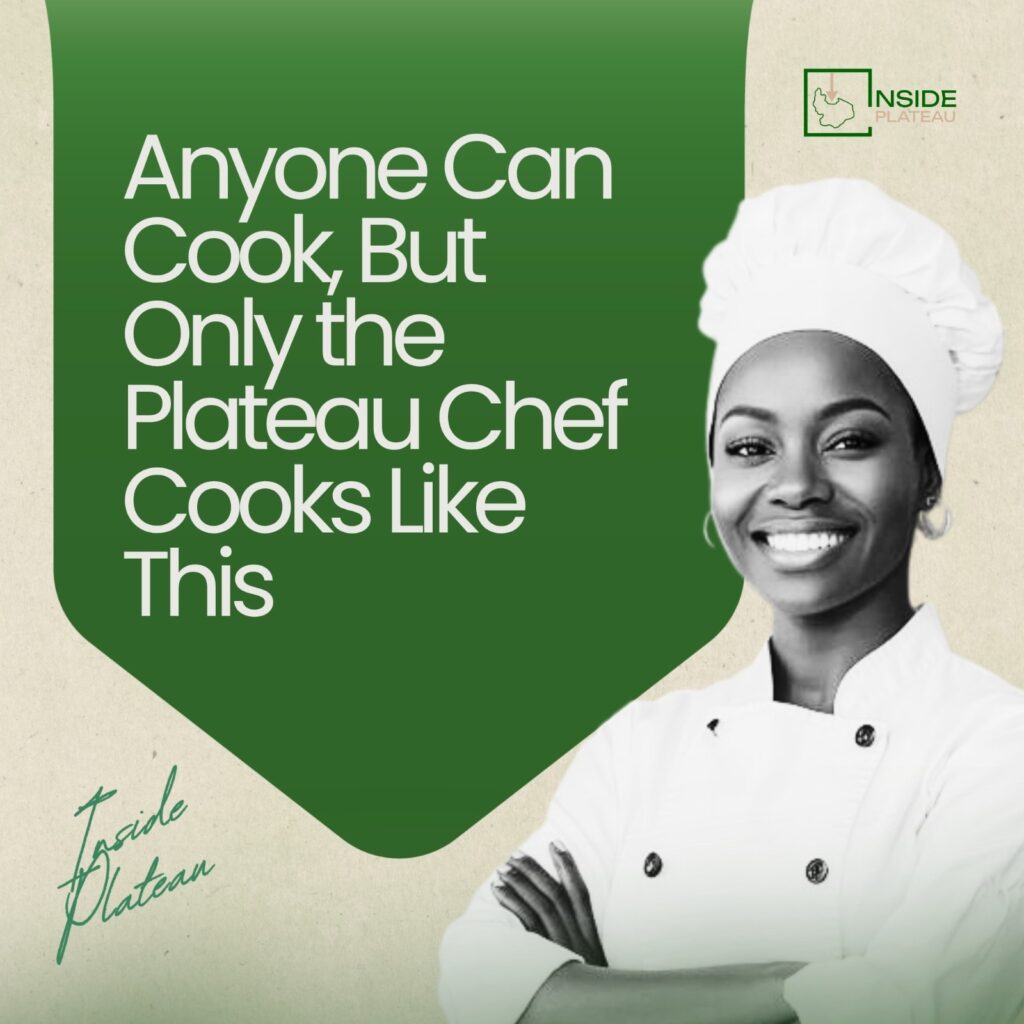“Anyone can cook,” as Gusteau from the animated film ‘Ratatouille’ once said. But should everyone be called a cook or a chef?
On the Plateau, that question isn’t answered by certificates, tall hats, or Michelin stars. It is answered by firewood, patience, and heart. Here, being a chef is not about prestige, but purpose. It’s about the woman who wakes before dawn to pound acha (fonio) for her neighbors, the young man experimenting with gwaza (cocoyam) chips in a roadside kiosk, the baker who still measures ingredients by instinct, not by scale.
The Plateau chef doesn’t chase applause; they chase understanding. They don’t just feed people; they study flavor like a language, learn texture like music, and turn simplicity into art.
Hands That Feed a City
They say the true test of a chef isn’t in the hat, but in the hands. Perhaps this is why some of the finest hands belong to women who never sat a day inside the four walls of a culinary school.
Take the woman who has been making gwote (fonio porridge) for as long as she can remember. Middle-aged now, she smiles when she says she has never had a bad gwote day. “I learnt it from my mother,” she says, “and she learnt from hers.”
For decades, her steaming bowls have fed miners, students, travelers, and families; all drawn in by the familiar scent of home. There is no recipe written down, no certificate on the wall, just instincts inherited and personalized: the kind that measures salt with the eyes and timing with the heart. To her, gwote more than just a meal; it’s memory and heritage served hot.
Across town, another woman has spent twenty-five years perfecting her take on African salad. What began as curiosity in her youth (how fresh lettuce, tomatoes, and native spices could turn into something beautiful) has become her livelihood. Her salads have seen four children through school, each scoop seasoned with laughter, labor, and love.
“Zuciya na ne, kowai,” she says when customers ask for her secret, meaning, she only pours out her heart.
But these women are not alone. Every day, the Plateau streets come alive with hundreds of such quiet masters: people who interpret the land through food. While cooking is survival for some, it is expression for others. Yet, whether for profit or family, the heart of the Plateau chef beats the same way: to nourish, to connect, to show love through food.
Curiosity, the Plateau Chef’s Core Ingredient
Abundance alone doesn’t make great food. It takes curiosity; that restless urge to ask, ‘what if?’
Arguably, here on the Plateau, nobody is content with just following recipes. They experiment, question, fail, and then try again.
One local chef laughed as she explained:
“I tried making masa without the boiled rice and failed. Then I added more boiled than raw rice and failed again. But that’s how I learn. I love experimenting because I want to know what makes things work and what makes them fail.”
Perhaps that was how Plateau dishes were born: from daring to stubborn joy; that quiet courage to ruin a batch just to understand it better. Beyond cooking, it’s science, storytelling, and soulful persistence rolled into one.
Sweet Potato, One of Plateau’s Unsung Flavours
If curiosity is the Plateau ingredient, then the sweet potato is its most faithful companion: humble, adaptable, and endlessly surprising.
Most people only know two ways to eat it: fry it or boil it. But here in Plateau State, this orange-fleshed tuber has become a whole language of creativity.
Take kambar (a sweet, chewy potato delicacy) born out of the desire to preserve sweet potatoes. What began as a survival trick became a beloved treat that has further evolved into many sumptuous dishes. In our homes, we’ve learned that sweet potatoes are not just food but innovation.
In the same vein, the Plateau kunu (millet drink) tastes sweeter because its brewers have discovered how to use the tuber as a natural sweetener, thereby cutting costs, adding depth, and keeping things local. And lately, new experiments have emerged: turning sweet potato into poundo for soups, and even grinding it into flour molded into chin-chin.
These are not random ideas. They are proof of the Plateau chef’s genius; the ability to transform one simple ingredient into ten possibilities.
As one student of the Plateau State University once said, “Sweet potato has become to the Plateau chef a mai ceto (a saviour)”
When the Land Becomes a Muse
If curiosity drives the chef, the land fuels it. Everything on the Plateau sparks imagination: rizga (livingstone potatoes), kanannade (Vigna unguiculata), acha (fonio), and even the greens in African salad.
Someone once asked the curious question, “How did they even know these things were edible?”
And one cook answered perfectly: “I look at muruci, our deleb-palm fruit, and I think, ‘how can this become something more?’ I look at rizga and wonder what happens if I make it differently. That curiosity keeps me going and I won’t stop trying until I’ve cooked up something new.”
That’s the Plateau gift: the ability to look at what others overlook and say, “Let’s try it!”
The Taste of Comfort
Of course, food here isn’t just creative, it’s comforting. Even the simplest meal can reset a tired day.
One respondent shared his experience one long afternoon that ended with muruci: peeled slowly and savored quietly.
“It tasted like yam, like potato, like the earth itself,” he said. “Before long, I was lost in all these flavours and in seconds, I was smiling again.”
That is the magic of Plateau food. It fills you up and brings you back to yourself.
Dreams Still Rising
And maybe that’s why so many Plateau chefs are dreaming bigger these days.
“My dream is to see a chain of Plateau restaurants and bakeries that celebrate our homegrown flavors,” one baker said. “We have the crops, the talent, and the taste. What we need now is the courage to think bigger.”
Buttressing further on this point, another added: “We can do it! We just have to stop playing small. I’m working on a yoghurt parfait I’ve never seen anywhere here. And when it’s ready, the world will taste Plateau.”
Dreams like these rise slowly like dough, but they rise all the same.
Cooking, the Plateau Way
Cooking goes beyond just performance; it is participation. We borrow onions from neighbors, argue over pepper levels, share recipes in whispers, and taste from each other’s pots like it’s a communal right.
On the Plateau, nobody eats alone for long.
That’s why every chef, baker, and caterer here doesn’t just feed people but also nurtures a sense of belonging.
A Full Circle
So yes, anyone can cook! But here on the Plateau, we cook differently. Our chefs wear aprons instead of egos, and their kitchens are stages of quiet genius. From masa makers to parfait dreamers, they are the keepers of flavor, memory, and hope.
The world may celebrate Michelin stars, but we celebrate kitchen scars: the burns, the laughter, even the experiments that didn’t quite work but still tasted like home.
Because here in Plateau State, to cook is to love; and that love—bold, humble, and endlessly inventive—is what makes the Plateau chef truly one of a kind.

